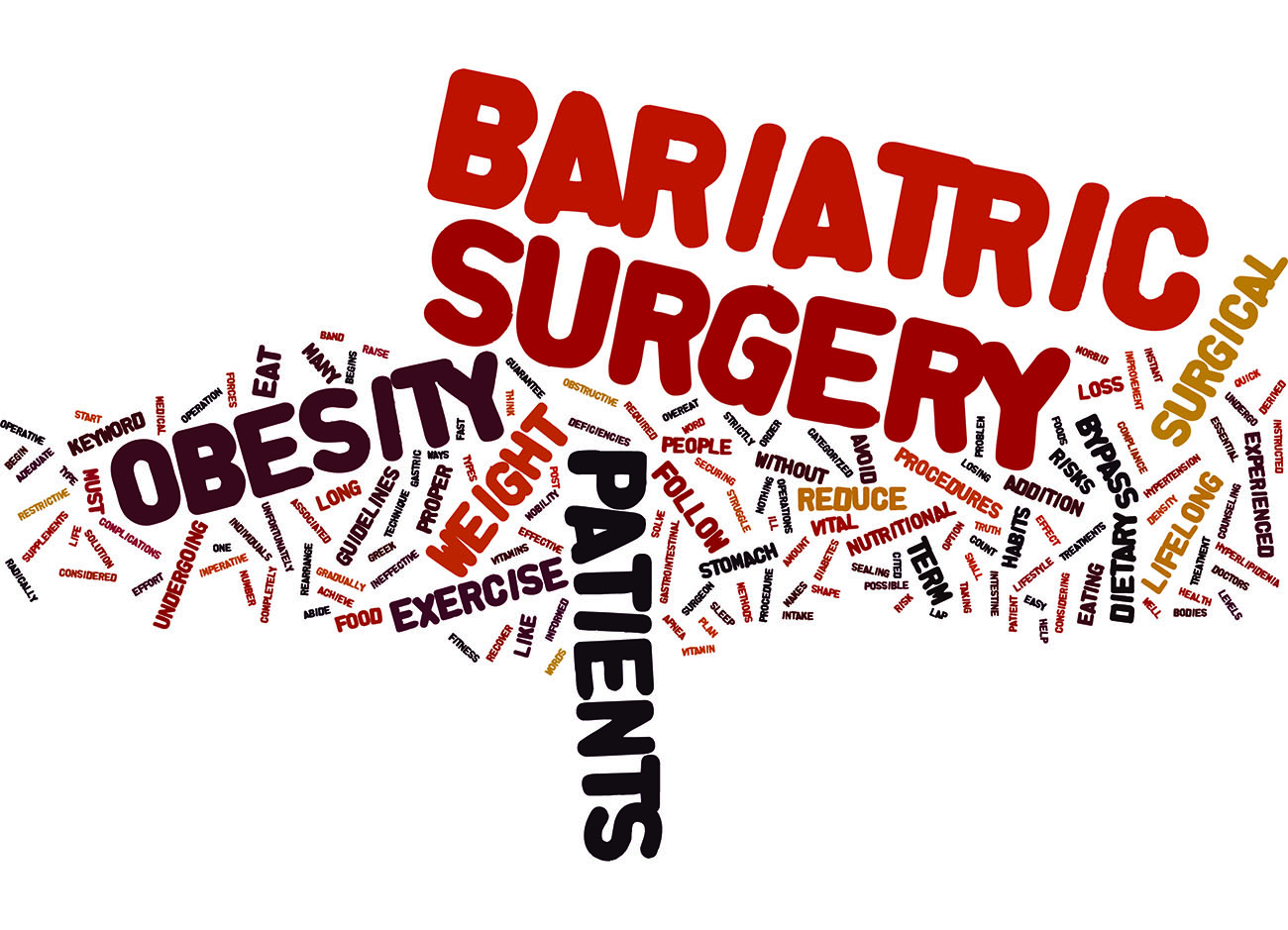Obesity is a disease that affects one-third of adults in the United States. While the obesity rates differ from state to state, the numbers of overweight and obese Americans have steadily increased since 1960.
The basic facts are that if your body mass index (BMI) is over 30 or you are 20 percent or more above normal weight, you are considered to be “obese.” Likewise, having a BMI of 40 or greater or more than 100 pounds over normal weight will land you in the “Morbidly Obese” category. Since obesity increases your risk of developing high blood pressure, Type 2 diabetes, stroke, gall bladder disease, various cancers, heart disease, and other medical problems, many people are turning to bariatric surgery as the answer to their lifelong struggles with weight.
There are many different types of weight loss surgeries. The three most common are: laparoscopic adjustable gastric banding (uses an adjustable band to pinch off a small piece of the stomach), open and laparoscopic biliopancreatic diversions (surgically bypass a significant amount of the small intestine and divert digestive juices from the liver and pancreas to the lower part of the intestine) and Roux-en-Y that surgically uses staples or sutures to create a small banana-sized pouch at the top of the stomach that is directly connected to the middle portion of the small intestine, bypassing the rest of the stomach. Each comes with risks and benefits.
Despite the appeal of weight loss surgeries they can be costly. According to HealthGrades, a national healthcare ratings organization, bariatric surgeries widely vary from state to state with Maryland averaging $16,390; California averaging $65,251. Consequently, people have turned to their health insurance companies to foot the bill.
In working with people desiring lose weight, I have become well-acquainted with insurance company requirements. And quite frankly, I am appalled.
Insurance companies have a broad spectrum of varying guidelines, which all seem to include a BMI of 40 or more or a BMI of 35 or more and serious co-morbidities such as coronary heart disease, diabetes, or obstructive sleep apnea. Other commonalities include a psychiatric evaluation and some documentation of varying years of an obesity history, some plans call for two; others five.
Beyond that, there is much variety over what types of “weight loss attempts” you have to have tried. Some require three months, some require six months of “physician or other healthcare professional directed” weight loss program and this too, depends upon the state and the plan.
In my opinion, this is the part that creates a dangerous set-up. Not preparing yourself properly for bariatric surgery can not only reduce your chances of long-term success, but can also set you on a collision course to regain weight.
All too many people look at weight loss surgeries as another quick fix and their ticket to a short cut for weight loss.
In my experience, just the opposite is true. Take the case of Maria, a tall, attractive, 49-year-old real estate executive who came into see me 10 years after her gastric bypass surgery. Coming from an appearance-oriented, family with two sisters who were models, she never felt like she could be herself. So she adopted the role of the “Perfect One” in her family. While her sisters lived their own lives, she being the oldest, took care of her parents and did everything “right.” She viewed herself as the “Perfect Christian,” proudly being a virgin into her late 20’s.
After years of failed diet attempts and some forays into exercise, she decided upon weight loss surgery, specifically, the Roux-en-Y. With only a psychiatric evaluation, medical clearance from her surgeon, and a six-month bariatric education program, which was mostly informational, Maria proceeded to eat her way up the scale to 325 pounds by her surgery date.
Post surgery, she had gotten down to her goal weight of 160 within in 24 months. She joined a gym and went religiously, carefully followed the food regimen laid out for her, and attended bariatric support groups. She never felt better—her knee and back pains were gone, she got off her high blood pressure and cholesterol medications and was no longer pre-diabetic.
She was much more social, going out with friends to bars, meeting men and beginning to date again. Suddenly, she found herself becoming more and more anxious and uncomfortable interacting with men. She had trouble handling all of the attention but chalked it up to not having dated in a long time.
As life went on, she began to use alcohol to manage her anxieties. The alcohol even helped her feel more comfortable sexually and she began to have more sexual relationships with multiple partners—all of which added to her newfound positive self-esteem. All along she never recognized that she was just transferring her dependency from food to alcohol and sex as new coping strategies.
Around this time Maria met the “love of her life.” In the haze of infatuation, she lost focus and went to the gym less frequently, and dropped out of her bariatric support group, in favor of spending time with her boyfriend. They got engaged, and moved in together. Things felt so good – he loved her unconditionally – as her family never had.
She felt nurtured by him, enjoying the romantic meals he cooked, which often included drinking fine wines. Other times, they frequented fast food restaurants, something that was taboo. Their intimate relationship was wonderful. Suddenly, everything began to come crashing down around her and little by little the pounds began to reappear. She had lost her focus and herself.
By the time Maria came to my office she was 250 pounds, having regained almost 100 pounds. She was back on high blood pressure and cholesterol medications. She was both terrified and paralyzed. We discussed what she knew had worked for her in the past –mindfully eating small low-fat protein meals, vegetables and a small amount of whole grain carbohydrates, drinking water, and waiting the allotted time between liquids and food intake. To reinforce her accountability, I had her keep a food journal. Planning ahead and having the foods in her house that she was comfortable eating were crucial.
Her use of alcohol also needed to be addressed. She admitted that her drinking had gotten out of hand. Moreover, the alcohol made her less conscious of what she was eating. She agreed to place a limit on herself of one or two glasses of wine on each of two weekend nights.
Furthermore, I impressed upon her the need for additional support beyond our sessions as well as reestablishing an exercise program. Reluctantly, she agreed to return to her bariatric support group but worried that it would take time away from her fiancé. Also distressing to her was my suggestion that she slowly begins a walking regimen and works her way back to the gym. On one hand, she envisioned charging back to the gym and running on the treadmill to speed her weight loss. Yet, on the other hand, she was torn again about taking time away from her fiancé.
We did a lot of work around her “all or nothing” thinking. She began to understand that this time her weight loss had to be more of a conscious process than something to quickly get rid of in order to feel better. She had to learn what really worked for her. She needed to use her voice to reinforce it rather than once again stuff down her feelings and discomforts with food, alcohol, and sex.
Finally, we addressed her fears about her fiancé leaving if she took care of herself and changed many of their food and alcohol-related activities. She became aware that not only was she afraid of being abandoned and rejected by him if she did this, but she also saw how he was deliberately sabotaging her food-wise, for fear that other men would find her attractive. Couples work was woven into the individual work and Maria’s fiancé became cooperative and supportive. Slowly and gradually, she began to lose weight and live a healthier, more balanced lifestyle, as did her now-husband.
That said, many times things don’t turn out as well. I have seen many pre- and post-surgical bariatric clients resort to alcohol, shopping, sex, gambling and other substances or processes to take the place of food rather than do the hard work necessary to ensure weight loss surgery success. Also friendships, family, and intimate relationships can positively or negatively change when one has weight loss surgery, for which one may not be adequately prepared.
In addition, I believe that bariatric surgery programs and insurance companies can do a much better job readying people for the multitude of life changes they will face after surgery.
So don’t be fooled, bariatric surgery of any kind is not a quick fix!
There’s no short cut to doing the emotional work necessary to have long-term success. Choose your mentality mindfully.

